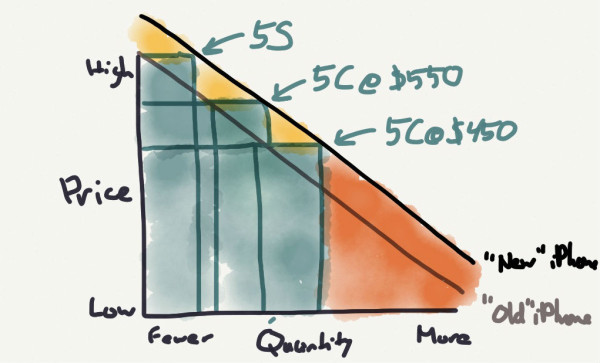Two Minutes, Fifty-six Seconds
Two Minutes, Fifty-six Seconds
After endless dithering , that’s how long it took me to know the iPhone 5C would cost $549 .
It was at two minutes, fifty-six seconds 1 that Tim Cook said there would be a video – a video! – about the iTunes Festival .
And it was awesome.
In case you didn’t watch the whole video (and you really should – it’s only a couple of minutes), this clip of the ending captures why it matters:

This was Apple, standing up and saying to all the pundits, to all the analysts, to everyone demanding a low price iPhone:
NO!
No, we will NOT compete on price, we will offer something our competitors can’t match.
No, we are NOT selling a phone, we are selling an experience.
No, we will NOT be cheap, but we will be cool.
No, you in the tech press and on Wall Street do NOT understand Apple, but we believe that normal people love us, love our products, and will continue to buy, start to buy, or aspire to buy.
Oh, and Samsung ? Damn straight people line up for us. 20 million for a concert. “It’s like a product launch.”

This attitude and emphasis on higher-order differentiation – the experience of using an iPhone – dominated the entire keynote and the presentation of features, with particularly emphasis throughout on the interplay between software and hardware.
- Retail Look at our new store with an entire room devoted to service. Paying more for an iPhone is worth it.
- iOS 7 You get all our new features, right away, for free. Only Apple gives updates immediately. Paying more for an iPhone is worth it.
- iWork, iPhoto, and iMovie You get amazing software, that’s only available on iOS, with your new iPhone. Paying more for an iPhone is worth it. 2
- iPhone 5C It looks and feels amazing, with a “bespoke” assembly and “solid dense feel you would not expect from a plastic product.” Paying more for an iPhone is worth it.
- A7 iPhone has the best performance. Paying more for an iPhone is worth it.
- Infinity Blade Look at this game that is only possible on an iPhone. Paying more for an iPhone is worth it.
- M7 iPhone fully integrates into every part of your day, and has exclusive apps like Nike+. Paying more for an iPhone is worth it.
- Camera We don’t focus on stats, we focus on helping you take better pictures through our integration of hardware and software. Paying more for an iPhone is worth it.
- Touch ID Apple notices and spends time on the tiny annoyances that you didn’t even notice, and does so by integrating hardware and software. And we want to protect your data, not use it. Paying more for an iPhone is worth it.
If you disagree, well, we won’t sell you an iPhone.
I wrote after the WWDC presentation that Tim Cook Was a Great CEO :
I had the good fortune of being an intern at Apple, which gave me the opportunity to spend an hour (along with a few hundred of my closest intern friends) with every member of the leadership team, including Jobs and Ive. Cook was, by a significant margin, the most impressive of all of them.
It’s difficult, in retrospect, to explain why he was so impressive, but I find my struggles eerily similar to the struggles business historians and sociologists have in explaining what company culture is, and why it matters. Tim Cook, at least to my young, rather unjaded eyes, was Apple. He spoke to me – and to every person in the room – as if I were the only person in the world, and that he truly wanted me to understand what made Apple unique. Oh sure, the words were there – he spoke about Apple’s focus, and willingness to say “no,” and about design – but it was the way in which he said it that made you believe. For me anyway, his reality distortion field was far more powerful than Jobs’.
Today’s presentation – which, make no mistake, had Tim Cook written all over it – reminded me of something else: Cook’s incredible sense of self. Cook is his own man, one of the few in the world who could follow in the footsteps of someone like Steve Jobs without losing himself in the shadow. It’s why Jobs picked him.
That assuredness and self-confidence was on full display in this presentation. This was Apple, confidently, and without a glimmer of doubt, declaring that the iPhone is special, that it’s worth paying for, and that people all over the world will do just that.
The strategy, then, is clear. The question remains, of course, as to whether or not it is right.
First off, this will result in more iPhones sold. I posted this chart Sunday in Thinking About iPhone Pricing (which is worth reading 3 if you missed it):

To the general public, the iPhone 5C is not an old iPhone 5. It’s a new iPhone 5C, and the demand will be much greater than it was for last year’s 4s. The price of a new iPhone is now 16% less than it was last year, and demand should rise by at least that much (and I think most pundits are seriously discounting the attractiveness of color ). Moreover, it’s no accident that the traditional closing advertisement was focused on the 5C. I expect the vast majority of ads to be the same, and the iPhone 5C to be the best seller in the line. Sure, it’s not $199 (unsubsidized), but it’s also not $649; to pretend nothing has changed is wrong.
Second, I expect Apple to move to a dominant position in the US market. iPhone has been gaining share for several years now, and the iPhone 5C at $99 will only accelerate that. I know the US market is special , but it still matters, particularly to Apple and a great number of app developers.
Third, this solidifies Apple’s hold on the Mercedes-Benz/BMW portion of the Asian market, particularly China. Is it out-of-reach for the vast majority of consumers? Yep. But it will be aspirational, something you put on the table to show others you can afford it. And, to be clear, there are a lot of people that can afford it. Saying stupid things like “the iPhone 5C is equivalent to the average monthly salary in China” belies a fundamental misunderstanding of China, its inequality, and its sheer size specifically, and all of Asia broadly. Moreover, when you consider a Mercedes is tens of thousands of dollars more than a Toyota (and on down the line in luxury goods, for whom Asia generally and China specifically is the largest market by far), $300 more isn’t that much.
Moreover, in China it’s Apple’s brand that is, by far, the biggest allure of the iPhone. Apps are free (piracy is mainstream), larger screens are preferred, and specs and customization move the needle with the mainstream far more than they do in the US. But no one else is Apple. Having a high price preserves that.
It is Asia, though, that is ground zero for potential Android-first development . While the 5C will move more iPhones, it will only very slightly slow Android’s massive market share domination, and it’s possible Apple will never break through in any significant way in markets like India or Indonesia. 4 Moreover, the Samsung brand is very strong in Asia, and Korean culture as a whole is increasingly dominant; you can’t escape Korean pop, Korean soap operas are the most popular shows continent-wide, and they both include/endorse Samsung heavily. A combination of must-have Android apps and Samsung chic would be problematic. 5
Apple, ultimately, has decided they’re ok with taking that risk.
As I wrote last week , strategy is about making choices, and Apple has decided to not even pretend to pursue market share, but instead embrace their up-market status. As long as they retain their app advantage, this will obviously be a profitable choice.
More importantly, it’s Apple doubling-down on what they are best at. I have railed against Blackberry and Nokia for trying to compete in areas they weren’t great at (OSs), instead of focusing on their strengths. Apple is doing just the opposite. They are avoiding a market share fight, which is ultimately about price and compromise, and are instead focusing on the experience of using their products and the advantages accrued by being fully integrated from the chipset to iTunes.
And that’s why they started with a concert; the iPhone is a brand, an experience, an aspirational lifestyle. Who wouldn’t want to pay just a bit more to be a part of that?
- All times are from the official event podcast in iTunes [ ↩ ]
- This is a tried-and-true strategy: iLife moved a LOT of Macs [ ↩ ]
- Of course I think so [ ↩ ]
- They will, however, be in better shape than Google in the aforementioned China no matter what happens; most Android there is Google-less [ ↩ ]
- I don’t really know the European market; I’d suggest Benedict Evans for a better view [ ↩ ]
文章版权归原作者所有。
